Addressing inconsistencies in online delivery by designing, delivering and reviewing targeted staff training in core digital skills
Opening summary
As part of the Advanced Teacher Status (ATS) programme, participants are required to undertake a quality improvement project.
SET’s Professional Status team reviewed all 60+ Quality Improvement Projects submitted as part of the October 2020 ATS cohort shortlisting the top 12 using a scoring matrix, including the below from Julian Knott, Teacher of Engineering at Brockenhurst College.
This editorial provides an overview of Julian’s improvement project which focused on designing, delivering and reviewing targeted staff training in core digital skills to address inconsistencies in online delivery at the college.
Research context
In March 2020 all education was expected to be delivered from home due to the coronavirus national lockdown. Brockenhurst College had to rapidly implement an online platform for teaching and learning and the chosen infrastructure was Office 365 and Teams. The ensuing three months of remote online teaching had varying degrees of success. The college conducted a debrief with teaching staff in the first week back after lockdown in June 2020, followed by a week’s intensive training to close the skills gap. From the start of the new academic year in September 2020, the college timetable featured one day of remote learning per week as a mitigation plan in case of a further lockdown.
As a result of interview/discussions with other teaching staff and the learning technologist in January 2021, a number of issues were still apparent despite the additional training the previous year:
- The ability and understanding of how to use digital systems was hindering staff in the delivery of lessons or work.
- The considerable time it takes to learn and develop new skills to become confident in using this technology.
Aims and objectives
The aim of this improvement project is to address the inconsistencies in online delivery by designing, delivering and reviewing targeted staff training in core digital skills.
Objectives are to:
- Evaluate the divide between current research, regulation, college policy and guidance for the delivery of lessons in our college
- Identify the core areas for development that staff desire for a structured approach to CPD and the perceived impact this will have on delivery
- Establish what is required from staff using a Digital Learning Matters group (DLM) to deliver recommendations for a staff training programme.
Methodology
- Collection of qualitative data through a Digital Learning Matters group consisting of 25 members across the college with wide ranging levels of digital knowledge and skills. This helped to inform what CPD was required.
- Collection of quantitative data through a Microsoft Forms questionnaire sent out to 15 members of staff including managers, teachers and staff. This informed decisions on the delivery format of CPD for the training week at the start of the academic year.
- Research ethics aligned with the British Educational Research Association (BERA, 2018) and the General Data Protection Regulation (GDPR, 2018).
Project findings and recommendations
Findings
The quantitative research indicated that, overall, there was a high level of satisfaction with respect to how supported staff felt in developing their digital skills to deliver online teaching, with 60% of staff scoring 4 or 5 out of 5 (Figure 1). However, there was still a significant minority who did not feel as well supported.
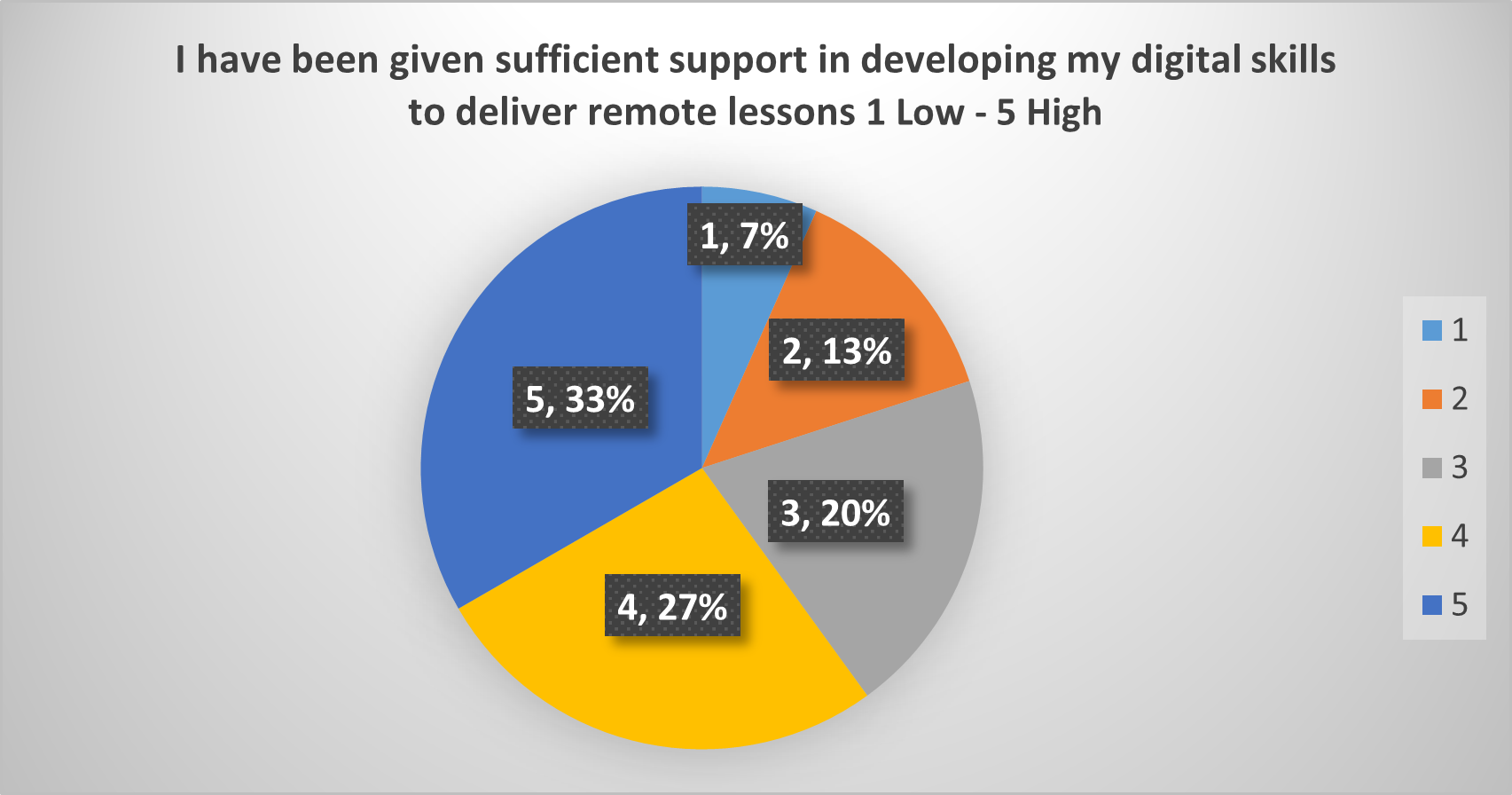
Figure 1
The majority of staff said they would welcome a training programme to improve skills using Teams and other software (Figure 2).
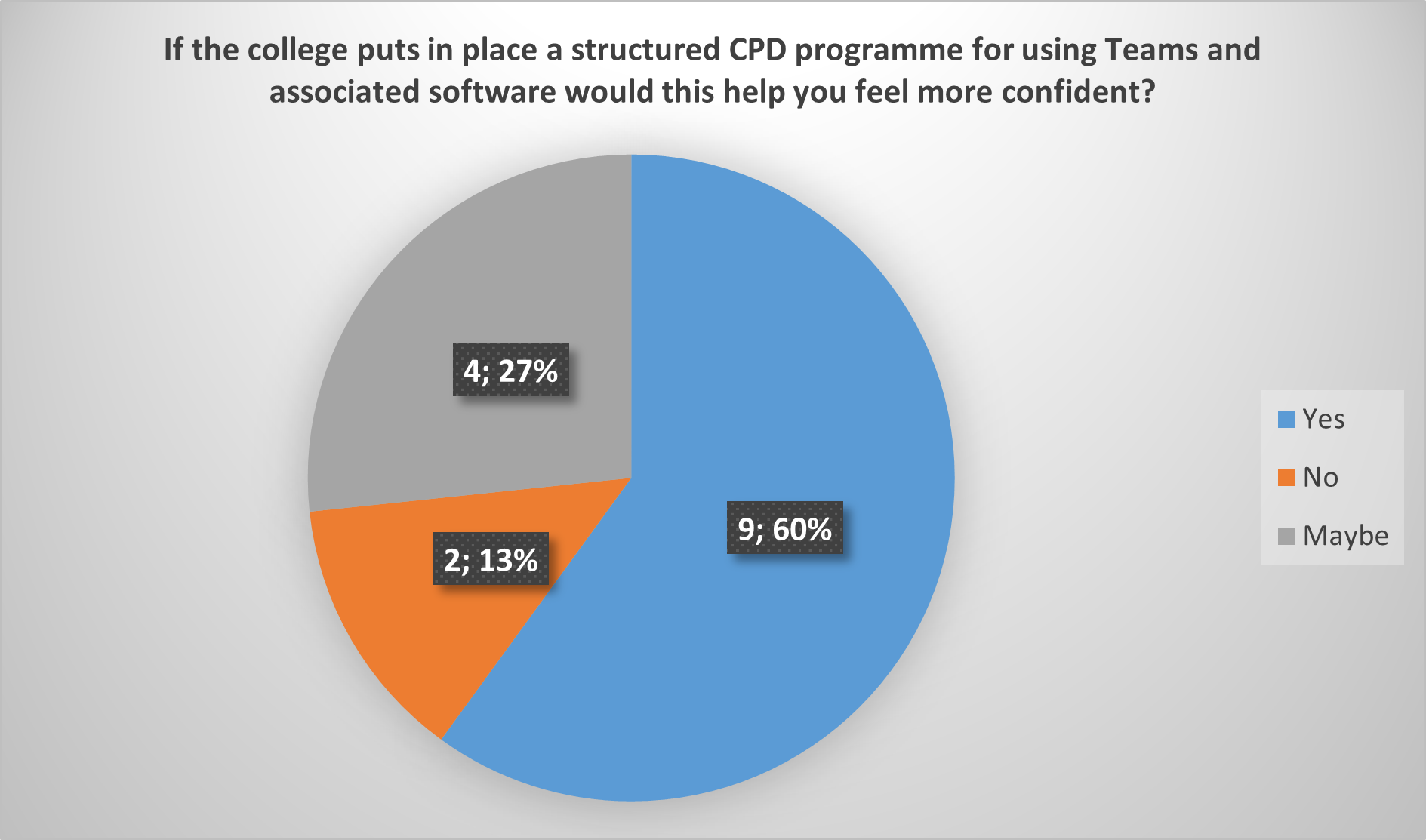
Figure 2
Feedback also suggested that staff either would prefer a structured or ‘dip in and out’ approach spread out over a period of time, rather than whole days (Figure 3).
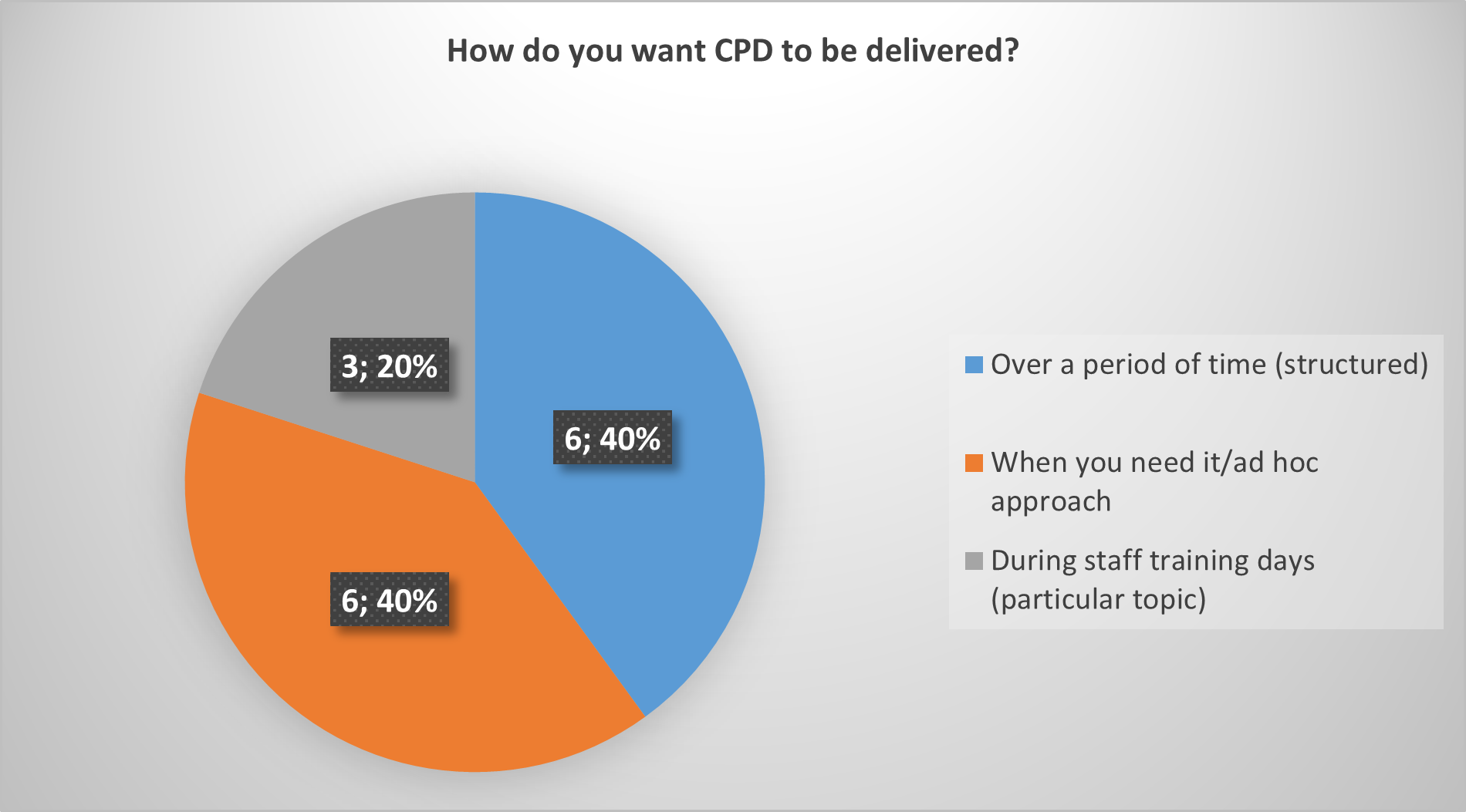
Figure 3
Almost half of the staff surveyed felt delivery should be tailored according to ability, from limited skills through to more advanced, with a third undecided (Figure 4).
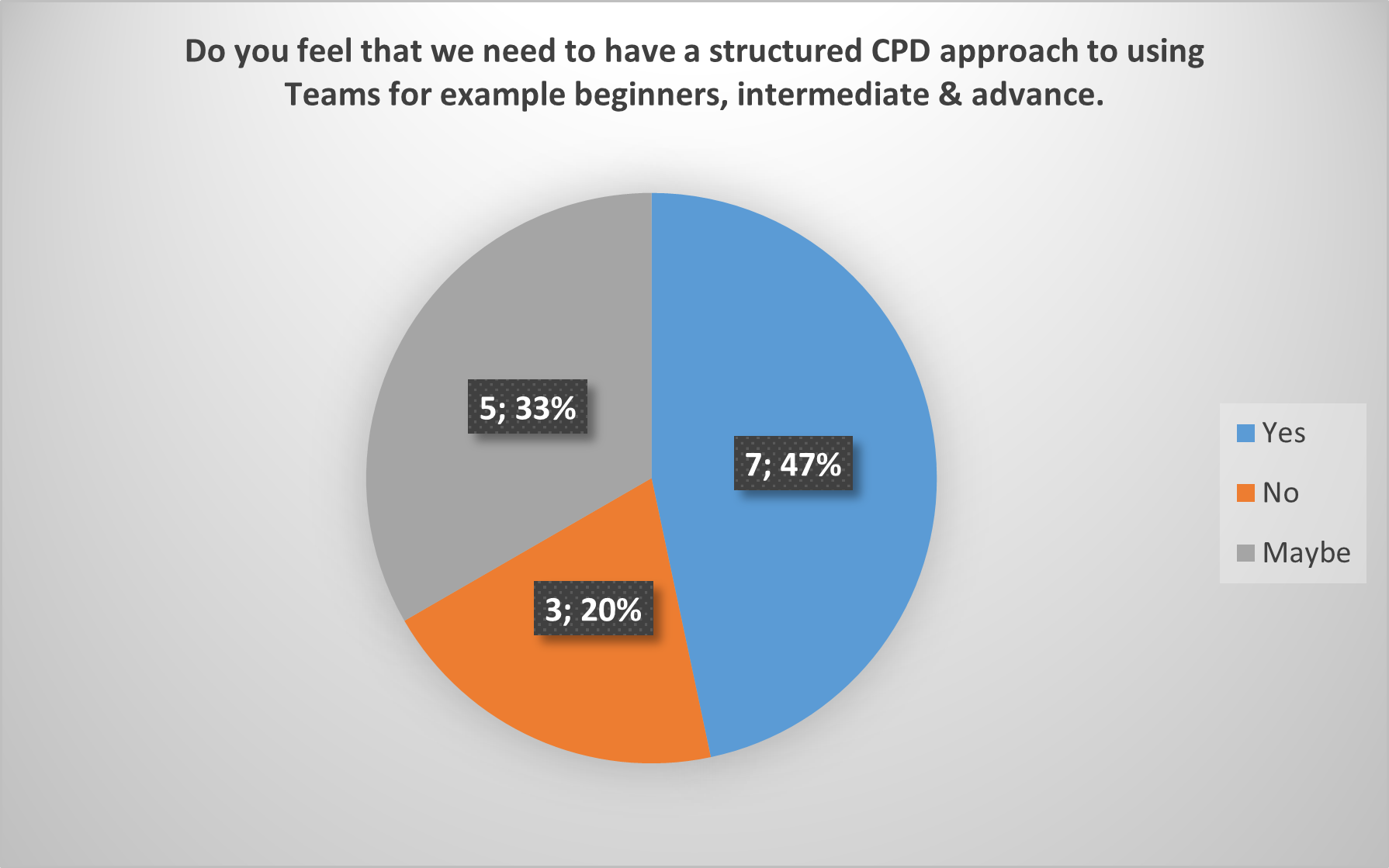
Figure 4
Finally, just over half of staff reported knowing where to access resources that had already been produced to support digital skills development (Figure 5).
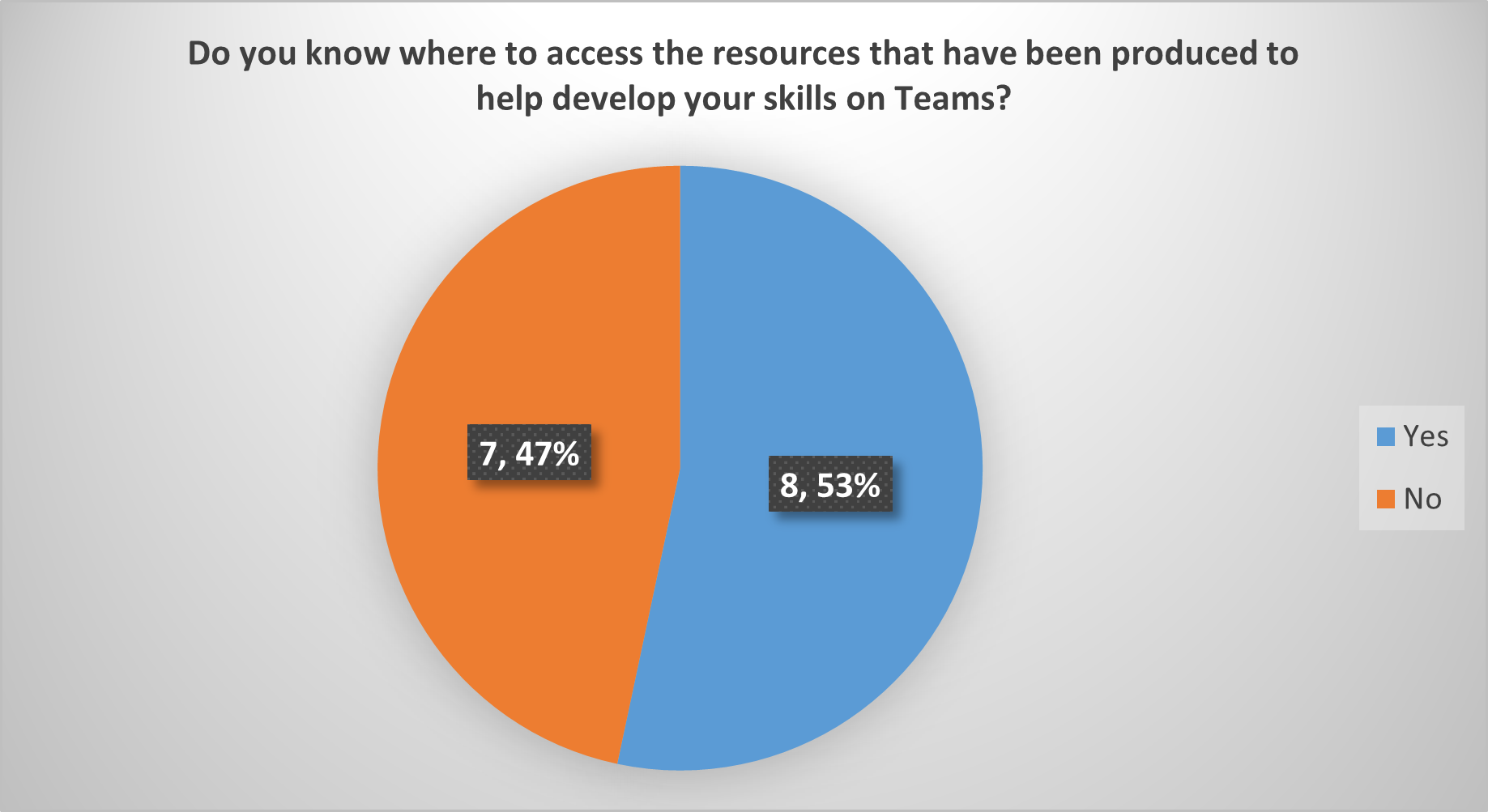
Figure 5
Overall, the findings from our survey were consistent with those reported by Jisc (Shaping the digital future of FE and skills, 2020), despite the considerably smaller sample size.
There were good signs that skills were improving and the DLM group has since started to make an impact on the delivery of digital skills training.
Many staff did not know where to find training materials. A greater proportion would now answer this question positively.
At the end of the academic year 2020/21, a team from the DLM group did some training in digital skills that was highlighted by the DLM group.
Recommendations
- Implement a format for staff to log CPD more effectively and formally. This will also highlight less proactive staff and can be used by the college to support those individuals/teams.
- The college should implement a digital learning plan/policy and the CPD policy needs to be closely aligned so monitoring can be targeted.
- Each curriculum area to have their own digital champion who is part of the DLM group to discuss digital training and skills gaps to enhance the portfolio of training provision.
Professional reading
British Educational Research Association (BERA, 2018). Ethical Guidelines for Educational Research (4th edition). [Online] Available at: https://www.bera.ac.uk/researchers-resources/publications/ethicalguidelines-for-educational-research-2018 [Accessed 19 March 2021].
Brockenhurst College (2020). Self-Assessment Report 2019-2020. Brockenhurst.
Brockenhurst College (2020). Staff Development and Training Plan 2020-2021. Brockenhurst.
Brockenhurst College (2020). Students’ Union Committee Meeting 2020. Brockenhurst.
Brockenhurst College (2021). Student Survey for Remote Working 2021. Brockenhurst.
Jisc (2020). Shaping the digital future of FE and skills. Bristol: Jisc. 13-15
Ofsted (2021). Remote education research. [Online] Available at: https://www.gov.uk/government/publications/remote-education-research/remote-education-research [Accessed 1 October 2021].

